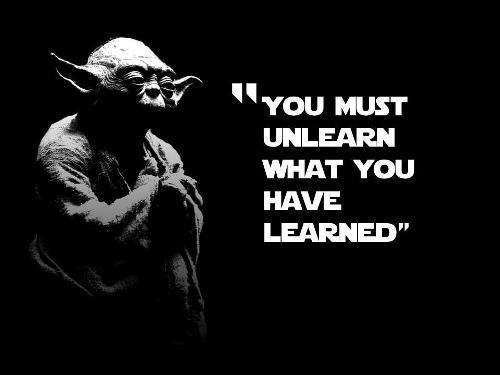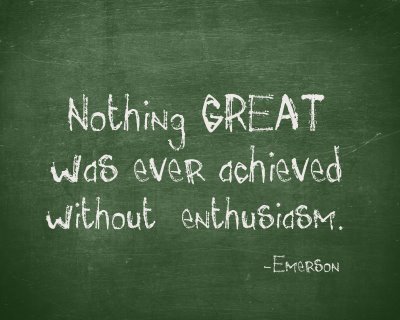Jeremie Averous's Blog, page 139
February 28, 2013
Why You Should Leave Your Ideas Grow Before Exposing Them
“After you plant a seed in the ground you don’t dig it up every week to see how it is doing” – William Coyne, former 3M executive, quoted in “Weird Ideas that Work” by Robert Sutton.
 This sentence was used in the context of creativity: when you’re planting a seed for a new product or a new idea, leave it undisturbed for a while to grow! It is the seedling that is the most fragile phase and needs to be protected.
This sentence was used in the context of creativity: when you’re planting a seed for a new product or a new idea, leave it undisturbed for a while to grow! It is the seedling that is the most fragile phase and needs to be protected.
For example, make sure creative teams operate outside the rush of the corporate world; or on a personal note, make sure that you give time for an idea to grow a bit before exposing it to the harshness of the world.
Because any new idea is just a fragile air draft that can disappear instantly. Because new ideas are precious and need time to grow and develop.
How well are you protecting your new ideas to let them grow enough to face the world?

February 26, 2013
(Good) Decision-making Depends on Conflict
“Decision making is not about consensus. It depends on conflict, and that is the key. What we found in companies that made good decisions is that the debate is real.” This is a quote from Jim Collins in the foreword of the book “Fortune: the Greatest Business Decisions of All Times“.

(Reasoned) conflict is key to decision-making
“It is real, violent debate in search of understanding“.
And this good conflict does not even have to end with an agreement: “Then, in the end, the leader makes the call. It’s conflict and debates leading to an executive decision. No major decision we’ve studied was ever taken at a point of unanimous agreement. There was always some disagreement in the air“.
Point taken: the next time you take a significant decision and everybody agrees, something is wrong. Either there has not been enough debate, or it is not the right decision.
How was you latest decision like?

February 23, 2013
How to Take Decisions in a Complex Environment
How can you take the (right) (best) decision in a complex environment? Rely on your team. Decide on the ‘who’ and not on the ‘what’.
That’s all. That’s so much.

How can you take the right decisions in a real, complex world?
Jim Collins reminds us in his foreword to the book “Fortune: the Greatest Business Decisions of All Times“: ”The greatest decisions were not “what” but “who?”, they were people decisions.”
“Fundamentally, the world is uncertain. Decisions are about the future and your place in the future when that future is uncertain. So what is the key thing you can do to prepare for that uncertainty? You can have the right people with you“.
The next time, instead of spending too much time developing spreadsheet projections over the next decades (which mean absolutely nothing), focus your energy on getting the right people in. Not just people like you, but a diverse and complementary team. Then through conflict and discussions, you’ll make your way through this complex world.
Where is your team right now? When do you start building it to thrive in this complex world?

February 21, 2013
Use Collaboration More to Deal with Uncertainty!
Now that we recognize that we should live with a large amount of uncertainty in our lives, and not believe like in the Industrial Age that the world can be made to be certain, how can we find a way to increase the uncertainty we can bear and turn this uncertainty into opportunity?
 Collaboration is the key here. Because through collaboration and creating tribes that can vet our creation, we have a group that can give us feedback before we expose ourselves too much to the world, with which we can discuss any weird idea that come to our mind. We have a group that can funnel to us the information we need to understand the present situation. We can then increase the level of uncertainty we expose ourselves while minimizing risk.
Collaboration is the key here. Because through collaboration and creating tribes that can vet our creation, we have a group that can give us feedback before we expose ourselves too much to the world, with which we can discuss any weird idea that come to our mind. We have a group that can funnel to us the information we need to understand the present situation. We can then increase the level of uncertainty we expose ourselves while minimizing risk.
Actually, collaboration is really a fundamental key to success in the real, complex world. It allows to draw ideas from multiple brains that have been expose to multiple situations and dramatically increase our own capabilities.
Maintaining our social network as a ‘secure base’ with which we can test our latest weird idea is a fundamental capability to explore new possibilities.
Certainty in our world and our lives was an illusion. We now know it can’t work. We now have the tools and the capability to routinely collaborate across continents with hundreds, thousands of people (yes, you also: how many people are you linked with on all your social network tools like Facebook, LinkedIn, etc?). We still don’t take enough advantage of this new capability because we don’t really understand it.
Take advantage of your social network more. Harness this collaborative energy to increase the amount of uncertainty you can cope with – and enjoy a better life while increasing your contribution.

February 19, 2013
Stop Propagating the Industrial Age’s Illusion of Certainty!
In the Industrial Age, for the first time in our long human history, we were conditioned into believing that our life, our environment could be made certain: regular salary increment and a sure retirement; regular working times; lower and lower variance of manufactured items and processes, etc.

How enjoyable is the “normal” of the Industrial Age?
The entire system was geared to make us believe that certain was normal. We tried hard to fit every event into normality; to diminish as much as possible the impact of unavoidable variation (like weather, for instance) on our lives. Any hindrance to our existence was to be considered a problem that needed to be addressed to bring it back to normality.
We need to recognize now how much of an illusion that was. In addition, that turned out to be quite boring. Freak events will continue to happen forever. We need to live with a large amount of uncertainty in our lives to be successful and invent the world we want.
Many people still live in the dream of the Industrial Age certainty (although, luckily, much less since the 2008 economic ‘crisis’ which shook many ‘certain’ existences). This myth continues to be propagated by large sections of our current institutions like social security, public schools… It is important to recognize it is a myth, and resolutely move into the Collaborative Age mindset of thriving on uncertainty.

February 16, 2013
How you Should Subtract Things Every Day from Your Life
A very famous quote by Lao Tze talks about wisdom:
“To attain knowledge, add things every day.
To attain wisdom, subtract things every day.”

Even Master Yoda’s wisdom is that one needs to unlearn!
We are not used to consider subtracting things from our daily life, unlearning what we know, do be part of what we should do. Still a lot of very respected wise people do insist on this key skill to progress in life.
We tend to add-on, increase the clutter on our desks and lives, but not so often do be subtract. Or when we do it, it is a real crisis and it becomes counterproductive. I am personally very guilty of adding up and seldom subtracting – up to the point where it becomes too much as I tend to clean up my life (sometimes a bit too harshly).
Being able to subtract progressively and maintain an acceptable level of clutter is a key skill for happiness and success, in particular in the world of the Fourth Revolution. A few minutes per day removing things from our desks and minds is the right solution. It’s tough but it needs to be done! Would you have any other suggestion?
Hat tip to Valeria Maltoni (Conversation Agent) for the quote and more insights

February 14, 2013
Why you should Fully Segregate Manufacturing and Creative Activities
Manufacturing (Industrial Age) and Creative (Collaborative Age) organizations require different approaches and skills. They are two different business models. As such, organizations should not try to run them in the same business unit.
Manufacturing organizations require:
compliance to the rules;
minimum variation;
carefully evaluated changes thus, continuous improvement;
production of large quantities and high physical capital intensity to achieve the necessary economy of scale.
Creative organizations require:
non compliance to rules, misfits and weirdos
discontinuous and radical change
small scale production and low capital intensity (outside human capital)

Apple is a key example where creative and manufacturing activities are separated. You are not obliged to treat manufacturing as subcontractors; but you need to make it at least, a separate business unit
How can you even imaging having these two kinds of activities under the same roof, under the same budget, under the same responsible person?
Following a very general recommendation in the field of entrepreneurship and even of management, two different business models should be separated. If not run in different legal entities, they should be run in different business units. Creation of the product needs to be separated from manufacturing production. The necessary interface needs to be managed through a carefully arranged agreement.
Separate fully your creative, project creation side from your traditional manufacturing side or you’ll never manage to take advantage of the Fourth Revolution!

February 12, 2013
Stop to be Excessively Specialized – Become a Generalist to be Successful in the Collaborative Age
In the late Industrial Age, to be successful in our careers we were supposed to be specialists. How often did I hear career advice in the form of dismissing any effort at being rather a generalist (and generally, deploring that I did not want to specialize in a well-recognized discipline).

Are you a Jack of All Trades?
Being specialized was great for the organization because the bureaucracy could fit you in a pre-determined box, could figure out what you should or could become, figure out what to pay you and in general, identify you as a particular commodity type. The Corporation hated types that could not be classified properly.
In the Collaborative Age, being excessively specialized is becoming a burden. We are not speaking here of being a Jack of All Trades; what we support rather is that the Knowledge Enhancing Exchaning Networker (K.E.E.N.) of the Collaborative Age needs to be a generalist with a few areas of particular excellence.
Excessive specialization precludes agility. Specialization is based on deep knowledge of something which necessarily stems from the past; it might help understand similar features in the future but certainly not significant, disruptive changes that would come from somewhere else. The specialists of the cathodic screen – a highly complicated device – have been wiped out by flat screens in a merciless manner.
Today you need to understand enough of the world to be agile enough. That is being a generalist. being well-travelled is a great way to understand the limits of personal assumptions. Of course, you also need to be world class at certain skills – and they might not be those skills that had been painfully codified by the Industrial Corporation. It might be creativity, leadership, networking, a gift for understanding computer code…
In start-ups everybody needs to do a bit of everything – which is also why deep specialists won’t fit in. Start-ups are about creating a new way of doing certain things – not repeating the old ways even slightly better. They don’t need specialists to thrive. They need generalists.
Even the Harvard Business Review makes the case for General Managers in this post “Bring back the General Manager“, lamenting that departmentalization of corporations since the early 1980′s has fostered specialist careers and that organizations are missing generalist General Managers!
Successful people of the Collaborative Age will be generalists with certain highly developed gifts. Don’t become a too narrow specialist. Open your eyes to the world and get ready to contribute through multiple channels.

February 9, 2013
How to, and Why Foster our Enthusiasm
According to Churchill, keeping enthusiasm when moving from failure to failure is the key to success. According to Emerson, “nothing great was ever achieved without enthusiasm“. What happens here?
 Enthusiasm, etymologically, means ‘inspired by the Gods‘, or even ‘possessed by the Gods‘. It described a quasi-divine state of excitement and zeal. It describes an energy that we can’t really explain, due to an attraction to an idea, a goal, a calling.
Enthusiasm, etymologically, means ‘inspired by the Gods‘, or even ‘possessed by the Gods‘. It described a quasi-divine state of excitement and zeal. It describes an energy that we can’t really explain, due to an attraction to an idea, a goal, a calling.
Can you foster enthusiasm? Do you need to wait for that Divine spark and energy? What can you do kindle your enthusiasm?
I believe that we can certainly work to improve our enthusiasm and excitement and do not need to wait for divine inspiration. It is certainly the key to much action and realization. We need to foster it and grow it within us.
How can we do that? By caring about our enthusiasm and helping it grow, notwithstanding ‘failures’ and ‘successes’. What counts is the journey, and how enthusiastically we discover more of the world around us and how we can influence it.
Kindle you enthusiasm, you need it; and we need it!

February 7, 2013
Moving from Failure to Failure without losing Enthusiasm
I like this quote by Winston Churchill - “Success is the ability to move from failure to failure without loss of enthusiasm“.
It triggers a lot of questions and reflection.

Are you lost in the midst of the maze, going from failure to failure?
The ability to move from failure to failure without losing enthusiasm is certainly a great quality and skill. Does that really lead to success? It depends what you mean by success. For sure, the road to success – in the sense of a unique contribution to our world- is littered with failures that need to be overcome. Failures that teach. Failures to be perfect. Failures of skill, timing and opportunities.
Still, does personal success and well-being require those failures? Maybe those failures are the stuff that we need to become aware of what we need to learn. And our ability to learn from our failures is certainly the key.
What did you learn from your last failure or half-failure?




